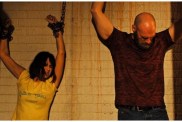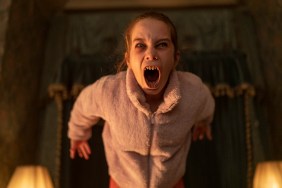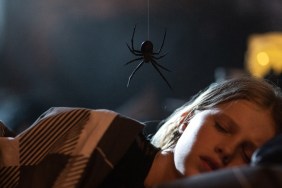
Every year a number of indie comedies bow at Sundance to good word-of-mouth, but once the festival ends the rest of us approach with caution, perhaps rightfully so. Quirkiness and weirdness are too often used to cover a weak foundation, to hide the cracks instead of filling them. When a movie relies on such flimsy attributes, it crumbles before our very eyes, but when heart rests at its core, it can be truly special. Ultimately that is what makes Me and Earl and the Dying Girl as good as it is; no reason to proceed with caution, just open your arms and embrace it.
Adapted by Jesse Andrews from his novel of the same name, Me and Earl and the Dying Girl tells the story of Greg Gaines (Thomas Mann), an awkward, self-deprecating high school kid determined to coast through his senior year as anonymously as possible. Over the course of his schooling he has neatly organized everyone into different cliques and sub-cliques, engaging with and conforming to the social mores of each, just enough so he is in good standing with all of them but not so much he fits into one himself.
Avoiding meaningful interactions like the plague, Greg spends most of his time watching classic movies and making terrible no-budget parodies of them with Earl (RJ Cyler), whom he has known for years but refers to as more of a co-worker than a friend. When the boys’ classmate Rachel (Olivia Cooke) — a member of Upper-Middle Class Jewish Senior Girl Sub-Clique 2A — is diagnosed with leukemia, Greg’s mother forces him to befriend her. Against his better judgment Greg does exactly that, setting into motion the pair’s “doomed friendship.” As Rachel gets sicker, Greg’s fortified walls break down and he begins to understand the true power of human connection.
Me and Earl and the Dying Girl won the Audience Award at Sundance in January, as well as the U.S. Grand Jury Prize from a jury including Cary Fukunaga and Edgar Wright. This fact is impressive but not surprising at all: the film deftly straddles the line between comedy and drama, with enough of the former to keep the audience laughing and a strong dose of the latter to keep us focused on the stakes made explicit by the film’s title. If I can make a comparison I’d say it feels like a combination of The Perks of Being a Wallflower and The Fault in Our Stars, though Andrews and director Alfonso Gomez-Rejon put a collective stamp on the project that makes it a triumph all its own.
Part of that stamp is formed by the film’s look. The camera work here is slick and stylish, with complex movements and framing unconventional for a film like this. Between tilts, pans, side dollies, and angled close-ups, several shots look like they would fit comfortably in a Wes Anderson joint, while others have an aesthetic strikingly similar to last year’s Birdman. It might seem strange to think about all these different comparisons I’m making actually working together to form a movie that works, but I assure you, they do.
One scene in particular gives an idea what I’m talking about: shot in medium and locked to fit both characters in the frame, the scene features Rachel sitting in a chair in the foreground on the left, Greg standing beside her bed in the background on the right. The sun pours in from the window behind Greg to light the room as the two talk continuously, without cuts, for two or three of minutes as their emotions escalate and evolve. The camera doesn’t move an inch, it just holds there, allowing the actors to play off each other, their performances the highlights of one of the most emotionally rich scenes in the film.
In the scene described above, Mann and Cooke give everything they’ve got, but they are far from the only standouts from a cast filled by newcomers and lesser-knowns. For my money, RJ Cyler gives the best performance in the entire film as Earl, and for as much as I didn’t like Jon Bernthal in Fury, he is among the highlights here as Greg’s heavily tattooed history teacher. He lets Greg and Earl camp out in his office during lunch to watch movies and talk about life, and while Greg has a father of his own (Nick Offerman), Bernthal’s character serves as another prominent father figure in Greg’s life.
Between the writing, the camera work, and the performances, I walked away with the impression Me and Earl and the Dying Girl is a film made by people who appreciate and celebrate the craft of cinema. Gomez-Rejon homages various filmmakers throughout, and Andrews’ script features two amateur filmmakers who parody classic movies of yore. From “The 400 Bros” to “The Seven Seals“, “Breathe Less” to “2:48 P.M. Cowboy“, “A Sockwork Orange” to “Mono Rash“, these jokes have the potential to be too cute, precious, or on-the-nose, but they never are. They hit at just the right moment and for someone who loves movies they instill an even greater appreciation for the artists responsible for bringing this project to the big screen.
If there’s one quibble, it’s with the placement of a plot point that feels a bit shoe-horned in. It shifts the focus of the film away from the central relationship between Greg and Rachel and toward an objective Greg and Earl must achieve; this objective isn’t tonally out of place, but in terms of structure its introduction feels sudden. The movie loses some steam from that point, yet remains light enough on its feet to keep the audience engaged, and by the time it reaches its climax there is more than enough emotion at play for us to forgive the sudden introduction of an objective that ultimately benefits the film in the long run.
Above all, my main takeaway from Me and Earl and the Dying Girl is how genuine it is. These days the “Sundance comedy” has practically become a genre in and of itself: take a few characters, make them self-deprecating but generally likable, give them some personality quirks, and have them navigate life for a period of time, inserting obstacles or twists that allow the characters to use their quirks to resolve the story in some way. While Gomez-Rejon does all those things here, the way he does them makes the film unique. Me and Earl and the Dying Girl lacks contrivance, it has no glossy Hollywood sheen or exaggerated quirkiness. It is sincere, honest, a film with heart; that is something to celebrate.









